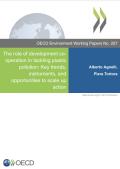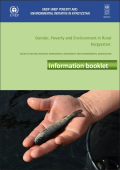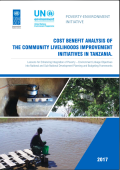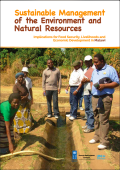
This report provides a comprehensive assessment of plastic pollution in developing countries and analyses the role that the international development community is playing to support developing countries face this challenge.

This report captures Poverty-Environment Initiative's 2016 achievements, as we gather the fruits of a more than decade-long effort to sow environmental sustainability into the field of development. It graphically highlights the work of the joint UNDP–UN Environment Programme global programme to improve climate resilience of the poorest and to effectively implement pro-poor environment practices and a just transition to a green economy and presents the kernel of a more effective means to achieving the 2030 Agenda for Sustainable Development.

This study concerns as to how to best bring development in ways that would reduce poverty, save natural environment and bring social justice. It explores the following questions: “What are specific areas of inter-linkages among the issues of gender equality, rural poverty, and environmental degradation in the Kyrgyz Republic?” “What are gender implications for sustainable livelihoods in rural Kyrgyzstan?”, and “What are gender-differentiated impacts of environmental degradation in Kyrgyzstan”

The report presents findings of the economic analysis for the Pro-poor Economic Growth and Environmentally Sustainable Development Project, which is a joint venture between the Government of the United Republic of Tanzania and the United Nations Development Programme (UNDP), and the United Nations Environment Programme (UNEP).

This paper provides macro and microeconomic evidence, based on empirical research, of the huge benefits of investing in sustainable environment and natural resource management and sustainable agriculture in terms of economic gains, poverty reduction, food security, and gender equality. The paper also demonstrates the economic, social, and welfare costs of not investing in socially inclusive and economically desirable sustainable practices. It reviews the gaps between existing policies, public investments and implementation and the implications for achieving national, regional and global development goals.
